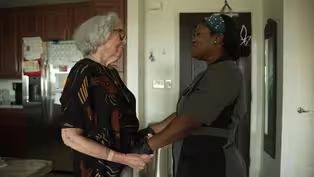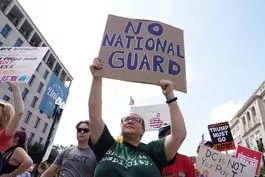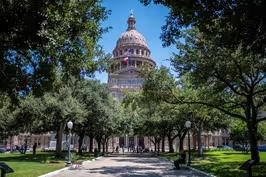
Tamara Keith and Amy Walter on Trump’s D.C. takeover
Clip: 8/11/2025 | 8m 23sVideo has Closed Captions
Tamara Keith and Amy Walter on Trump’s federal takeover of Washington, D.C.
NPR’s Tamara Keith and Amy Walter of the Cook Political Report with Amy Walter join Amna Nawaz to discuss the latest political news, including President Trump’s federal takeover of Washington, D.C., the redistricting battle in Texas and other states and Trump's upcoming meeting with Putin.
Problems playing video? | Closed Captioning Feedback
Problems playing video? | Closed Captioning Feedback
Major corporate funding for the PBS News Hour is provided by BDO, BNSF, Consumer Cellular, American Cruise Lines, and Raymond James. Funding for the PBS NewsHour Weekend is provided by...

Tamara Keith and Amy Walter on Trump’s D.C. takeover
Clip: 8/11/2025 | 8m 23sVideo has Closed Captions
NPR’s Tamara Keith and Amy Walter of the Cook Political Report with Amy Walter join Amna Nawaz to discuss the latest political news, including President Trump’s federal takeover of Washington, D.C., the redistricting battle in Texas and other states and Trump's upcoming meeting with Putin.
Problems playing video? | Closed Captioning Feedback
How to Watch PBS News Hour
PBS News Hour is available to stream on pbs.org and the free PBS App, available on iPhone, Apple TV, Android TV, Android smartphones, Amazon Fire TV, Amazon Fire Tablet, Roku, Samsung Smart TV, and Vizio.
Providing Support for PBS.org
Learn Moreabout PBS online sponsorshipAMNA NAWAZ: For more on redistricting politics and President Trump's federal takeover of D.C., I'm joined now by our Politics Monday duo.
That is Amy Walter of The Cook Political Report With Amy Walter and Tamara Keith of NPR.
Good to see you both.
TAMARA KEITH, National Public Radio: Hello.
AMY WALTER, The Cook Political Report: Good to be here.
AMNA NAWAZ: So, we reported at the top of the show there, Tam, about the president saying he's placing D.C. police under federal control, deploying hundreds of National Guard troops, says it's about crime, even as the data shows that crime has been declining.
Why is he doing this now?
What's the intention here?
TAMARA KEITH: There have been some very high-profile instances of crime in D.C. that have come close to the Trump administration and have gotten on the president's radar.
But, to be clear, he has been talking about wanting to take over Democratic-run cities since he ran for president the first time in 2016.
This is not a new theme for him in any way.
This is certainly an escalation.
And D.C. is the one city, it's the one place where he actually has the power to do this.
Obviously, he has to declare an emergency.
And there are questions about how much of an emergency this moment is right now, given the decline in crime.
But there are a large number of murders that do take place in Washington, D.C.
Relatively, other cities are higher, but it's still a high number or a high share, a high crime rate.
It is the lowest it's been in 30 years, but it's still high.
So he is going after this, and he's also trying to send a signal to other cities.
You saw what happened in Los Angeles with calling in the National Guard there.
This is something he wants to do.
And he's trying to send a signal to cities like Chicago, one of the cities he called out, also Baltimore, and wants them to be afraid, I think.
AMNA NAWAZ: Amy, how do you look at this in terms of the message it's sending and whether he may expand this approach?
AMY WALTER: Yes, that he can -- yes, it is that he can do it.
If you ask why, it's because he can.
And Tam's exactly right.
Since the minute he announced for -- his candidacy in 2016, he said, "I alone can fix it."
And this has been a central theme, really specifically of the second term.
I alone has been really used now on, well, pretty much everything we're going to be talking about for the rest of our segment.
But whether it is drawing congressional districts, that's the purview of the state legislature.
This was directed by the president of the United States into territory that normally the legislature handles.
Who -- what should we do with Putin?
Well, normally -- or not normally, but traditionally, Congress has a say in that.
And Congress did have a very significant sanctions bill that was tabled, in part because Donald Trump wants to cut the deal himself.
So this is the message that he likes to send, which is, I'm the one who's going to handle it, I'm the one who's going to do it.
All the other agencies, localities, and others who have traditionally had a role are going to take a back seat.
AMNA NAWAZ: Well, let's talk about that Texas redistricting case.
You just heard Stephanie Sy's conversation there with the Republican state lawmaker, Carl Tepper.
Tam, we know this is a map that the president pushed for, that he wanted to see this gerrymandering occur.
It could get Republicans in the state up to five additional seat.
Dozens of Democratic lawmakers still remain out of the state to prevent that quorum from happening and the map moving forward.
How do you see this ending?
TAMARA KEITH: Well, as the Republican lawmaker you had on just said, he says there's 100 percent chance that ultimately these maps go through one way or another.
I think that what is happening is an arms race of sorts to try to gerrymander every possible vote, every possible seat out, to really take this uncertainty out of the coming midterm elections.
So it's not just Texas.
There's talk of Indiana.
There's also then Democratic states like Illinois and California, especially, where Governor Gavin Newsom today sent a letter to President Trump, which I don't know is going to be received with open arms, where he said, how about you don't do the Republican gerrymanders and we won't do the California gerrymander that could offset the Texas gerrymander?
It's like the American public has said repeatedly that they don't like gerrymandering in one way or another.
It's pretty unpopular, but this has become yet another polarized partisan fight where it's like the other guy's gerrymandering is really bad and my gerrymandering might be OK or justifiable.
AMNA NAWAZ: Amy, to that point, in Texas, there is funding for flooding that needs to go through that's going to be held up as a result of this.
Could there be backlash against Republican lawmakers who are trying to push this through with flooding there in terms of how people look at it?
And also this term that Tam used about the arms race, could this set off a gerrymandering arms race between the parties?
AMY WALTER: I know.
That is definitely an open question, and Republicans are hoping actually that Democrats get blamed for not getting enough money to flood victims because they chose to leave the state, rather than come and have this conversation to the public.
And this is where I love to talk about, which is you can draw all the districts that you want, and they certainly are trying to make them as partisan as possible both in California and in Texas, but you still have to have campaigns, you still have to have candidates.
And the environment of the moment that we're in matters a lot too.
So, for example, in those Texas districts, if you look at how Donald Trump did in those districts in 2024, he won all of those districts by a pretty strong margin.
But if you look at how he did in 2020, in some of those cases, Biden won those districts or Trump won by a smaller percentage.
In other words, what Republicans are counting on is that 2026 is going to look a lot more like '24 than it did like 2020.
There's no guarantee.
Even in this era where you can gerrymander within a millimeter of the perfect district, there's still no 100 percent guarantee you're going to get all the seats you want.
AMNA NAWAZ: Meanwhile, if we look ahead now, Tam, we know the president's gearing up for a face-to-face meeting with Russian President Vladimir Putin in Alaska on Friday.
It doesn't look like the Ukrainian president's going to be attending that.
This is a war that President Trump said he would end within a day of coming into office.
We're seven months in now.
What can he hope to get out of this meeting?
TAMARA KEITH: Yes, and I think that this is a frustration of his that he hasn't been able to bring an end to this war that he said never would have happened if he was president and would end as soon as he became president.
He is already lowering expectations for this summit.
When it was first announced, he was talking about we're going to get a peace deal, we're going to get a cease-fire agreement.
Now he's saying, well, I'm just going to go in there, I'm going to feel things out.
And he has repeatedly been frustrated by Putin and has begun voicing it, including using some harsh language at times, that Russian President Vladimir Putin tells him what he wants to hear, says he wants peace, and then does the exact opposite.
Trump has called it tapping me along.
Well, he's going to find out with this summit whether Putin is continuing to tap him along.
And he's leaving open that possibility, which I think is sort of a downgrade in his expectations from where he was last week.
AMY WALTER: And I will be fascinated to see what Congress does, if indeed this does not turn out to be a big wonderful peace deal or that things fall apart or the president's not happy with the outcome, whether they do bring back the sanctions bill, which put significant, significant sanctions on countries that are getting Russian oil and on Russian products.
This would be, I think, another important test for how Congress wants to get itself involved with this conflict or whether they want to keep this in the purview of the president.
AMNA NAWAZ: We will wait and see how Congress reacts and how that meeting goes.
Amy Walter, Tamara Keith, always great to see you both.
Thank you so much.
AMY WALTER: You too.
TAMARA KEITH: Good to be here.
Al Jazeera’s Anas al-Sharif killed by Israeli strike in Gaza
Video has Closed Captions
Clip: 8/11/2025 | 4m 38s | Al Jazeera’s Anas al-Sharif and 4 other journalists killed by Israeli drone strike in Gaza (4m 38s)
A Brief But Spectacular take on better women's health care
Video has Closed Captions
Clip: 8/11/2025 | 3m 16s | A Brief But Spectacular take on revolutionizing women's health care (3m 16s)
How Trump's immigration policies are affecting caregivers
Video has Closed Captions
Clip: 8/11/2025 | 8m 29s | How Trump's immigration policies are affecting caregivers and nursing homes (8m 29s)
The legality of Trump's D.C. takeover
Video has Closed Captions
Clip: 8/11/2025 | 8m 1s | The legality of Trump's D.C. takeover as statistics show decline in crime (8m 1s)
'We're allowed to be partisan,' Texas Republican says
Video has Closed Captions
Clip: 8/11/2025 | 6m 12s | 'We're allowed to be partisan' in drawing congressional maps, Texas Republican says (6m 12s)
Providing Support for PBS.org
Learn Moreabout PBS online sponsorship
- News and Public Affairs

FRONTLINE is investigative journalism that questions, explains and changes our world.

- News and Public Affairs

Amanpour and Company features conversations with leaders and decision makers.












Support for PBS provided by:
Major corporate funding for the PBS News Hour is provided by BDO, BNSF, Consumer Cellular, American Cruise Lines, and Raymond James. Funding for the PBS NewsHour Weekend is provided by...




